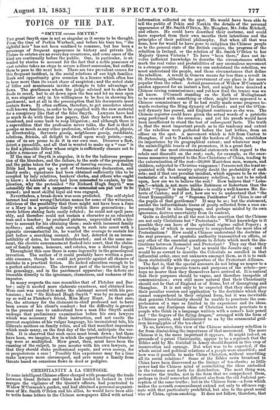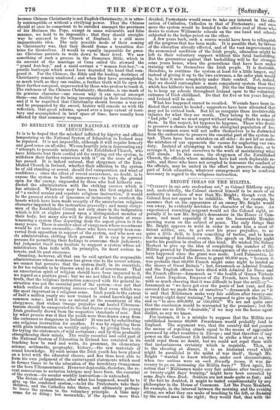CHRISTIANITY A LA (31:111V OISE.
IF some intelligent Chinese officer charged with promoting the trade between Great Britain and China had landed in Ireland in 1848 mangre the vigilance of the Queen's officers, had penetrated to Widow M'Cormack's garden, and had obtained personal acquaint- ance of Mr. Smith O'Brien and his allies, he would have been able to write home letters to the Chinese newspapers filled with actual information collected on the spot. He would, have been able to tell the public of Pekin and Nankin the details of the personal appearance of Mr. Smith O'Brien, Mr. Meagher, Mr. John Mitchell, and others. He could have described their costume, and could have reported from their own months their intentions and the principles of their political philosophy. But when all that was done, how far would he have gone to enlighten the Chinese people as to the general state of the British empire, the progress of the rebellion in Ireland, or the relation of Mr. Amith O'Brien to her Majesty Queen Victoria P To have " been there," does not in- volve sufficient knowledge to describe the circumstances which mark the real value and probabilities of any anomalous movement in a.strange country. Before we can understand the rebellion, we must understand the people, and those circumstances that define the rebellion. A revolt in Geneva means far less than a revolt in St. Petersburg, although the government of one place is far more popular than the other. Actual possession of Widow M'Cormack's garden appeared for an instant a fact, and might have deceived a Chinese roving commissioner; and yet how frail the tenure was we all know. O'Connell standing on the Bath of Mullaghmast to be crowned with something or other, might have appeared to a Chinese commissioner as if he had really made some progress to- wards restoring the Ming dynasty of Ireland; and yet the O'Con- nell dynasty has passed, and England continues as she was. The Chinese reporter could have given the actual words of a patriotic song performed on the occasion; and yet his proofs would have been insufficient to stand the test of subsequent facts. The truth is, that the most important proofs as to the tendency and extent of the rebellion were gathered before the last letters, from an officer on the spot. A movement which is felt from Canton to Shanghae, if not to Nankin and the borders of Pekin, establishes its importance by its geographical extent; and whatever may be the unintelligible tenets of its promoters, it is a great fact. Some of the most circumstantial statements with regard to the rebels cast discredit on the rest ; such, for example, as the enor- mous massacres imputed to the Neo-Christians of China, tending to the extermination of the rest-20,000 Mantchou men, women, and children, subjected to Christian vengeance ! Persons not the least ac- quainted with that country utterly doubt the probability of such acts; and if that one peculiar incident, which appears to be so oha- acteristio of a headlong missionary rebellion, is not to be relied upon, how are we to believe the rest ? How believe that "I.obe- sea"--which is not, more, unlike Robinson or Robertson than the Tahiti " Opano " is unlike Banks—is really a well-known Mr. Ro- berts of Canton; and if not, how are we to understand that "the Great Tranquillity " or " Supreme Pacificator " of China is one of the pupils of that gentleman? It may. be so; but the statement, amidst the indiscriminate tissue of gossip collected frcim a race ex- pressing itself in alien language, and perhaps misled by its own ignorance, derives uncertainty from its context. Quite as doubtful as all the rest is the assertion that the Chinese are not only Christians but "Protestants." What knowledge is it possible they can have of the spiritual regime called Popery; a knowledge of which is necessary to comprehend the mere idea of Protestantism? How could a Chinese understand the doctrine of the real presence, of apostolic authority transmitted ex officio, or any other of the essential questions in debate which mark the dis- tinctions between Romanist and Protestant ? They say that they are "followers of Jesus "; but so would the Jesuits say; and it would be as correct to describe the Celestials as enrolled in that influential order, once not unknown amongst them, as it is to rank them statistically with the supporters of the Protestant Affiance. The fact is, that the special accounts do not bring us nearer to a knowledge of the precise tenets and purposes of the rebels—per- haps no nearer than they themselves have arrived at. It is natural that their purposes should be vague, and therefore incapable of communication ; even still more natural that their Christianity should not be that of England or of Rome, but of Quangtung and Shanghae. It is not only to be expected that they should give their peculiar version and application to the doctrines which they cannot comprehend in their original form, but it was inevitable that genuine Christianity should be unable to penetrate the com- prehension of a rape so limited in its experience and its ideas. How can any European ideas of Christian tenets penetrate to a people who think in a language written with a camel's hair pencil and " the fingers of the flying dragon," arranged with the form of a Chinese puzzle, and familiarized to us by the ornamental grid- iron hieroglyphic of the tea-chest? To us, however, this view of the Chinese missionary rebellion is far from diminishing the importance of that movement. The more Chinese it is, the more important it appears. It might indeed, on grounds of a-priori Christianity, appear to be a reproach that the Bibles sold by Mr. Gutzlaff in Amoy should flourish in this crop of insurrection and carnage. But what was to be expected, if the whole social and political relations of a people were unsettled; and how was it possible to make China Christian, without unsettling all its social relations ? Some of the Bibles sown broadcast in China have been discovered as the linings of tea-chests; so little power had the Chinese mind of assimilating the ideas embodied in the volume sent forth for distribution. The next thing was, to receive the truths, not in the form that we comprehend them, perhaps in itself somewhat different also from the old Judaical per- ception of the same truths; but in the Chinese form—a form which makes the seventh commandment extend not only to offences cog- nate with that particularly prohibited, but also to the great social vice of China, opium-smoking. It does not follow, therefore, that
because Chinese Christianity is not English Christianity, it is utter- ly oontemptible or without a vivifying power. That the Chinese should at once be competent to be enrolled amongst the provinces of his Holiness the Pope, except in some colourable and false manner, we hold to be impossible ; that they should straight- way be annexed to the Church of England, is a still more impracticable idea. The only possible mode of their coming to Christianity was, that they should frame a transition doe- trine for themselves. It would be equally impossible for genu- ine Christian patriots to write down to their level. We saw something of such a process in the Demerara Bible, which in its account of the marriage at Cana called the steward the "grand foot-boy," and a maid-servant a ".woman foot-boy,"—a puerile burlesque which must have degraded the hand that com- posed it. For the Chinese, the Bible and the leading doctrines of Christianity remain unaltered ; and when they have accomplished as much truth as they can realize, a further truth will lie open for their further conquest, unperverted by those who profess to teach it. The rudeness of the Chinese Christianity, therefore, is one mark of its genuine character—one reason why it can spread amongst them—one facility for its being incorporated in their institutions ; and if it be regretted that Christianity should become a war-cry and be propagated by the sword, history will console us with the reflection, that great reforms, spread over a large extent of terri- tory and accomplished in brief space of time, have usually been effected by that summary weapon.



























 Previous page
Previous page